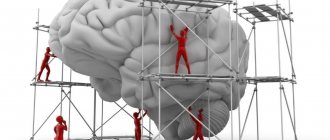Over the past few years, interest in the concept of “empathy” has increased significantly: if previously this term was used only in scientific circles by philosophers and psychologists, now it can be found both in fiction and journalistic literature, and in everyday communication. This growth in its popularity is due to the fact that empathy plays a huge role in interpersonal communication and is of particular importance for absolutely all people without exception.
However, despite the introduction of this scientific term to the masses, many people still do not fully understand what it actually means: the vast majority believe that empathy is synonymous with sympathy, but this is not entirely true.
In order to dispel this common misconception, we have prepared this article, from which you will learn how the term “empathy” arose and developed, what levels of empathy exist, what opportunities are hidden in highly developed empathic abilities, how to evaluate and improve them.
The evolution of scientific approaches to the study of empathy
The phenomenon of empathy has been studied for a long time: initially it was considered within the framework of philosophy and had a completely different name, then it was studied within the framework of scientific psychology, and only after many years an integrative approach emerged, according to which the concept of “empathy” is interpreted to this day.
Empathy as a phenomenon of cognition
Initially, the phenomenon that is now called empathy arose within the framework of philosophy. The German philosopher Theodor Lipps wondered how it is possible to know objects and phenomena of the surrounding reality, especially the consciousness of other people, if we only have our own consciousness. He came to the conclusion that when we see the state or action of someone else, a kind of imitation of reality arises in our minds, which causes sensations, as a result of which we begin to experience emotions or feelings that we attribute to the object we are observing.
In simple words, Theodor Lipps understood that we know others only through our own feelings and nothing else: in this case, feelings become both an instrument of knowledge and its source. Theodor Lipps called this phenomenon the word Einfühlung, which translated into Russian means “feeling.”
The German philosopher Wilhelm Dilthey shared Lipps's views and came to the conclusion that since psychology is the science of the human psyche and, in particular, his experiences, then the method of psychology should be nothing more than “empathy,” i.e. empathy is, in psychology, putting oneself in the place of another person with the goal of understanding and “sharing” his thoughts and feelings. This idea served as the basis for considering “feeling” within the framework of psychology [T. Karyagina, 2013].
Empathy as a communication phenomenon
The German psychiatrist Karl Jaspers identified “empathy” as one of the main methods of phenomenological psychiatry, followed by the American psychoanalyst Heinz Kohut who also developed Dilthey’s idea in his works.
Soon, interest in “feeling” in scientific circles was reduced to almost nothing, but theories of sympathy began to rapidly develop, according to which there are feelings that connect people in the process of interaction: sympathy, care, pity, friendliness, altruism, etc.
The term “sympathy” served as a kind of prototype of empathy, and the Anglo-American psychologist Edward Titchener translated the word Einfühlung as “empathy” by analogy with it: since sympathy is “with feelings,” then empathy is “into feelings.”
Soon, the American psychologist Carl Rogers outlined the value of empathic abilities in psychotherapeutic work and in the personal development of a person as such.
As a result of the development of ideas about empathy as a phenomenon of cognition, on the one hand, and as communication, on the other, it became a dual concept [T. Karyagina, 2013].
An Integrative Approach to Empathy
As a result of considering empathy as a phenomenon of cognition and attitude, its understanding by science has reached a qualitatively new level: empathy began to be perceived as the ability to comprehend the emotional state of other people and respond emotionally.
More specifically, empathy is, in simple words, the human ability to:
- read (recognize or identify) the emotional state of other people;
- identify this state with your personal feelings and emotions;
- give an emotional response to the received feelings and emotions, aimed at benefiting the person whose emotional state has been read.
As we can see, the essence of empathy is to understand another person by focusing on his emotions and feelings: to understand a person, it is necessary to analyze not what he thinks, says or does, but what he feels. Only by concentrating on internal experiences, and not on external manifestations, can we truly understand each other and provide each other with help and support.
Let us explain the scheme by which empathy “unfolds”:
- our own feelings help us understand by analogy what another person feels;
- understanding the feelings of another person allows us to understand him (to know his true essence);
- a deep understanding of the essence of a person gives us the opportunity to act in such a way as to support and help him.
At the same time, empathy can have two directions and be used both to help other people and for one’s own benefit:
- Humanistic empathy is when a person uses his emotions and feelings that arise from awareness of another person's distress or well-being to support him. This manifests itself in the form of joy, compassion, empathy, pity, etc.
- Egocentric empathy is that a person uses information received about the emotional state of another to assess his own well-being. So, for example, awareness of the joy of another can lead a person to the understanding that he is unhappy, and awareness of someone else’s fear can lead to one’s own peace of mind [A. Rean, 2003].
It is important to note that integral features of empathy are altruistic forms of response and a general positive attitude in communicating with people. Therefore, cases in which a person uses the ability to understand the emotions of others to achieve his own selfish goals do not constitute empathy.
Empathy can be accomplished in two main ways:
- Emotional empathy involves the use of projection and imitation mechanisms (a person projects a situation onto himself and tries to experience it “in his own skin”).
- Cognitive empathy occurs through intellectual processes (a person makes analogies and comparisons mentally, trying to logically understand what the other is feeling).
When studying the phenomenon of empathy, it is important to pay attention to its two main forms:
- empathy allows you to experience emotions and experience your own feelings about the emotional states of other people;
- empathy involves the subject experiencing the emotional states of another by identifying himself with him.
Thus, as we said in the introduction of our article, empathy is not synonymous with the word “sympathy,” which is only one of its forms.
Now that we understand the essence of empathy, let's look at the mechanisms that underlie its emergence and development.
Mechanisms of emergence and development of empathy
Science explains the phenomenon of empathy by the presence of mirror neural networks, thanks to which, when observing the actions and states of other people, the parts of our own brain that are responsible for performing these actions or feeling these states are excited.
Empathy is based on a person’s understanding of emotions and feelings, therefore its main development occurs in the preschool period: young children begin to actively empathize with other people from the age of 3, and at the age of 4-6 years, the child’s basic empathy manifests itself in relation not only to loved ones, but and to all people in principle.
Already at the age of 5, a child can not only feel, but also reproduce the emotional experiences of others and associate them with certain actions. At the same age, children begin to distinguish emotions by expressive signs (facial expressions, pantomime, etc.), while verbal functions play a special role in recognition and understanding. The child most clearly recognizes and understands negative emotions.
During the preschool period, children also develop an understanding of more complex emotions associated with the development of feelings of a different order, which include aesthetic, intellectual, practical and higher (moral) feelings. Then the child begins to understand that sometimes emotions can be ambivalent, i.e. a person can simultaneously experience two contradictory feelings, and also that emotions are not always caused only by external factors, but sometimes they are influenced by internal, subjective factors.
In preschool age, empathy manifests itself in a quite vivid, one might say, even acute, form. Moreover, it is almost always embodied in the child’s actions: if he is happy for another, he may rush to hug him, if he is jealous of someone, he will definitely complain, etc.
It is important to note that a child’s emotional learning comes with serious difficulties; moreover, its results are much less stable than learning motor and sensory skills. But unstable manifestations of emotional responsiveness are a sign of the presence of pathology of varying severity.
Social factors play a special role in the formation of empathy. The sociality of emotions lies in the fact that they are acquired in the process of interaction with other people, and then on their basis the child’s perception of social norms and values, as well as “emotional standards” is formed, which for the rest of his life almost entirely determines how he relates to himself, communicates with other people and behaves in society. For example, a lack of understanding of social emotions can lead to aggressive behavior or increased levels of anxiety, which persist into adulthood.
Researchers identify two main reasons that lead to emotional disturbances and reduce the level of empathy: unfavorable relationships with other people and the child’s own world of experiences.
There are also a number of serious pathologies, the main symptoms of which are a complete lack of empathy and/or its impairment: autism, psychopathy and narcissistic personality disorder. Impaired empathy is found in the clinical picture of not only the above diseases, but in them it is most pronounced and is one of the main symptoms.
However, even among those people who are born with the ability to empathize, its level varies significantly.
Levels of empathy development
Neuropsychologist Chris Frith has identified three levels of empathy:
- Basic neural empathy manifests itself as “emotional contagion.” A person feels the emotions of other people, but is not aware that he is doing this, i.e. does not distinguish other people's emotions from their own.
- At the second stage of development of empathic abilities, a person recognizes the emotions of other people and realizes that they do not belong to himself, but to someone else, but “emotional contagion” still occurs, although it is not so pronounced.
- At the highest level of development of empathy, a person consciously recognizes the emotions of other people, but “emotional contagion” does not occur. Simply put, a person understands what others feel, but does not experience it himself [C. Frith, 2010].
Now let’s look at how the level of empathic abilities affects a person’s life and why we need them at all.
What it is
Emotional empathy is a term denoting the state of a person when he connects to the emotional sphere of another, usually implying a negative connotation of emotions. But empathy has no restrictions on its manifestations, therefore, as a result, it gives a feeling of closeness, warmth and support. Such interaction most fully describes friendship and faith in a person, because implies not so much practical help, provided coldly out of logical calculation, as acceptance of emotional experiences, and providing another with a sense of wholeness.
A person can only demonstrate this quality on his own; it is impossible to make someone else feel the approximate range of their emotions or worry about a topic that is insignificant to them. On the part of the recipient, empathy is always perceived as something pleasant, giving a feeling of calm and lack of loneliness in the face of overwhelming emotions. But if such behavior is demanded from people, remembering how favorable it was, then nothing but strong resistance to somehow participate in the interaction will be achieved.
Empathy cannot be controlled or intentionally created, although it is a skill that can be trained. Its structure has something similar to one’s own feelings, which arise spontaneously in relation to the surrounding reality, but are little controlled, although with certain practices, long-term psychotherapy or self-analysis a person can be able to transform them.
It is the difference in the attitudes of others and the internal processes that occur with a person during empathy that do not allow this category to be attributed only to positive manifestations of individuals. This is considered a good trait among those who want to receive support and sympathy, while the emotional state of empathy of the person himself takes him into the sensory sphere of another, where not only his own identity is lost, but also control. This is somewhere similar to the loss of one’s self, when the desires of another are perceived as one’s own, his ideas seem exclusively correct, and a sober assessment is only possible when people come out of the merger, and there is no common emotional sphere. In order not to lose yourself in emotional impulses, you need to be able to distance yourself, both from someone else’s joy, which can carry you into unknown euphoria, and from someone else’s pain, which destroys the nervous system and psyche.
The presence of this feeling is an exclusively subjective category that has a great influence on the general process of formation or frustration of moral norms of society.
Empathy often borders on pity and mercy, the ability to self-sacrifice and empathy - all these categories are direct keys that strengthen the humanistic direction of human development. The development of empathy occurs from childhood, and although it has an innate basis as the ability to empathize, it requires further internal work.
The role of empathy in human life
According to the main hypothesis, mirror neurons were formed in living organisms during evolution in order to speed up the process of adaptation of a newborn so that he could evaluate the manifestations of the environment, capturing the attitude of more “experienced” relatives towards them.
Empathy in communication has the greatest value and importance: it is one of the main components of emotional intelligence and constitutes a certain core of communication, on which a person’s ability to build, maintain and develop interpersonal relationships depends, therefore developed empathy is necessary for every person living in society.
However, for some people the level of development of empathy plays a special role, which is primarily due to the specifics of professional activity. It is an integral condition of psychotherapeutic activity, since only empathic understanding contributes to the establishment of trusting contact between the therapist and the client and guarantees the effectiveness of treatment. Also, developed empathic abilities are urgently needed for teachers, teachers and medical workers, police officers, the Ministry of Emergency Situations, etc.
But if in some cases developed empathy is a necessary condition for the implementation of professional activities, in others it represents only one of the factors for the success of its implementation - this applies to all other professions that, to one degree or another, involve interaction with people: sales workers and services, managers, etc.
Let's give a clearer description of people with varying degrees of development of empathic abilities.
Low level of empathy
People with underdeveloped empathic abilities have difficulty establishing, maintaining and developing relationships with others. They do not understand their own feelings or the emotions of other people, and cannot correlate them with actions and thoughts. In most cases, such people are not able to find mutual understanding with the people around them in principle, but this can be expressed in two extremes: either the person behaves “closed” and detached, or aggressively. Such people are individualists, they work well on their own, rationality prevails in their thinking, etc.
Average level of empathy
A person with an average (or normal) level of development of empathic abilities has good control, shows and understands his own emotions, and also tries to behave in such a way that others do not feel bad about his words and actions. However, usually such a person judges people by their words and actions, without focusing on their feelings and emotions. Building relationships is not a serious problem for him, however, “depth” in these relationships, as a rule, is not present.
High level of empathy
A person with a high level of empathic abilities can pick up even small signals that indicate the emotional state of other people. He is able to understand almost any person and find an individual approach to him. Such people do not judge others and are distinguished by healthy altruism and goodwill. As a rule, they become good psychologists, doctors, teachers, or choose another profession related to helping people.
You can determine the level of your empathic abilities using the following methods:
- Balanced Emotional Empathy Scale (BEES).
- Emotional Empathic Tendency Scale (EETS).
- Empathic ability test proposed by Viktor Boyko.
It is important to note that in most techniques, the characteristic of high levels does not imply the ability to ignore “emotional contagion,” as neuropsychologist Chris Frith puts it. Therefore, after you take the empathy test, be sure to pay attention to the interpretation of the results.
However, a low level of development of empathic abilities always indicates the need to increase it in order to learn how to interact correctly with other people, and an average indicates that you have sufficient empathy, but you can increase it if there is a desire or need.
The meaning of the word empathize
Examples of the use of the word empathize in literature.
The dogs, especially the first-year puppies, vigorously empathized with the race, gave out breaking voices, the rams huddled together and stamped their feet, as they do in danger, when, for example, they smell a wolf, and the old dereza goat Zina ran up to the butt of last year's wormwood and weeds. hay and watched the chase with the expression of an avid football fan.
The working of angels and archangels into the human soul in the German-northern regions was not just a memory, but even during the very stay of Christ Jesus on Earth, people could see this working in, they were involved in it, they empathized with the work of angels and archangels on their soul.
In the further course of pre-earthly existence, the empathetic consciousness of the formation of the future earthly organism becomes more and more vague.
He could speak to the moon respectfully, and pleadingly, and tenderly, he felt connected with her by subtle spiritual ties, he thoroughly knew the life of the moon and actively participated in its destinies and transformations, he empathized with the waning of the moon and its renewal as a sacrament, suffering together with her and being frightened when it seemed that the moon was threatened by illness, danger, change and misfortune, when it lost its shine, changed color, dimmed, ready to go out.
Therefore, it was not the reported facts themselves, but the writer’s own fate and the courage of the Russian man, who stood on the basis of Orthodox morality, that forced us to closely follow the cycle of life and empathize with the author of the memoirs.
Not a single viewer, from the most refined to the very average, will be able to remain indifferent and not empathize with my manic fetishistic obsession - after all, we will be talking about a completely reliable story, and moreover, reproduced as truthfully as no documentarian can.
They are small, said Ishtar, both professions require the ability to empathize.
Not restrained by the main branch, they would give a huge variety of forms and would only be unable to create intelligence due to their deafness, inability to empathize, to hear the feelings of others.
To tell the truth, the need for reading, for a meaningful spiritual life, remains enormous among the domestic reader, and he more than satisfies it with the current wealth of books, retreating to the literature that he trusts and empathizes with - and these can be the most unexpected books.
And the duel of actors on stage is seen by thousands of eyes, thousands of souls are captured by it, thousands of people empathize with the fight - who will win, what is the fate of the vanquished?
Chief resuscitator Creech and dozens of assistants, consultants, advisers, backups, who had long ago lost the ability to empathize with tragedies, were serving their usual duties.
Source: Maxim Moshkov library
Developing Empathy
To develop your empathic abilities, you need to develop communication skills and gain experience interacting with completely different people. There are many effective methods for increasing your empathy potential, but today we will highlight just a few of them.
Learn to understand and deal with your own emotions and feelings
Use emotion cards for this: write down a list of all existing emotions on a piece of paper and write next to each the situations when you experienced them. Or keep a “diary of feelings” and throughout the day write down what emotions and feelings you experienced, what events led you to this. This way you will learn to recognize emotions and the reasons for their occurrence.
Expand your circle of contacts
To increase empathy, you need to understand people better. This can only be done if you communicate with completely different people: gender, age, nationality, social and financial status, views, interests, temperament, character, etc. Most people interact primarily with those who are similar to them, but in this case, expressing empathy is much easier. Try to get to know and understand those who are radically different from you.
Spend more time on live communication
The rapid development of information technology is increasingly leading to the fact that communication is moving online. However, communication in this format serves to distort the understanding of other people and regress empathic abilities, because we do not see the true emotions of those around us, but only observe what they are trying to show us with one or another “emoji” or even attribute to each phrase the emotional message that seems correct to us. Only live communication can teach a person to recognize other people’s emotions correctly.
Practice active empathic listening
Concentrate your attention on what the person wants to convey to you, and not on what you yourself think about this, i.e. give up judgment. Don't be distracted by extraneous stimuli: put down your phone, don't look around, maintain eye contact, don't interrupt the speaker, etc. And be sure to ask clarifying questions to better understand what the person really wants to tell you. This will allow you to learn how to establish trust with people and understand them better.
Use the technique of reflecting or mirroring emotions
After you listen to your interlocutor, try to retell what he was trying to convey to you, focusing on his emotions. Show the person that you understand how they felt: do this in both verbal and non-verbal ways. This will allow you to properly support and empathize with the person.
All of the above recommendations will help you increase the level of your empathic abilities when directly in contact with emotional states. However, there are a number of ways to learn empathy indirectly:
- Train your attention . Learn to concentrate on the little things. This way you can learn to recognize the slightest manifestations of other people’s emotional states.
- Read fiction and watch films with a psychological twist. This will help you better understand how other people feel in certain situations, and what external manifestations these feelings lead to.
- Play board games. For example, “Imaginarium” will help you track other people’s thoughts, and “Mafia” will also teach you to recognize lies.
- Take acting classes or practice the “role reversal” technique. This will allow you to literally “put yourself in the other person’s shoes” and understand how they feel.
- Read Julia Gippenreiter’s book “Communicate with your child. How?" Using clear examples of parent-child communication, it will help you understand how to communicate with absolutely anyone.
To summarize, we can say that empathy plays a major role in communicating with other people. A low level of empathy “separates” a person from other people, prevents him from building harmonious relationships with others and affects the overall level of his personal development. Moderately developed empathy gives a person the ability to communicate with other people, but does not allow them to fully establish mutual understanding and provide the necessary help and support to others.
And only highly developed empathy is sufficient to remain a “human” in any situation and to be truly conscious in one’s words and actions towards other people, so each of us should strive for this level.
However, it is important to note that highly developed empathy has its downside: if a person does not know how to control his own emotional states, but at the same time is sensitive to the emotions of other people, this can lead to personal distress or emotional deregulation - the emergence of a strong negative reaction to the experiences of another person , which manifests itself in the form of anger, anxiety, aggressiveness, irritation, sadness, etc.
Personal distress can have an extremely negative impact on a person and lead to difficulties in socialization, various psychological traumas and psychosomatic diseases. The fact is that “emotional infection” by other people’s negative emotions, which a person cannot cope with, leads to the fact that he loses the ability to achieve the main goal of empathy - the correct response to the feelings of another person, because stops thinking about the feelings of other people, and his only goal is not to provide support, but to help himself.
In most cases, personal distress results in a person simply avoiding the source of negative emotions and feelings, but if this is not possible, the consequences can be much more dire than simply failing to provide support to another [T. Karyagina, 2013].
Therefore, it is extremely important not only to develop an understanding of other people, but also to manage your own mental states. And our online program “Mental Self-Regulation” will certainly help you with this, which will allow you to master the best scientific techniques for managing emotions and relaxation.
We wish you success and sincerely believe that you will be able to develop your ability to empathize to the highest level! We also suggest taking a short test to consolidate your knowledge:
We also recommend reading:
- Storytelling
- Hellinger constellations: an effective method or a hidden threat?
- Humanistic theories of personality: what to take from history to modern times
- 6 Skills to Develop Emotional Intelligence
- How to Train Empathy: 6 Scientific Methods
- Nonviolent Communication by Marshall Rosenberg
- What is consciousness?
- 10 Linguistic Concepts Everyone Should Know About
- Machism: Ernst Mach's contribution to the development of the philosophy of positivism
- The SERVQUAL model is an effective way to measure service
- Circle of Empathy
Key words: 1 Communication, 1 Psychoregulation
How to learn to empathize
For some people, the skill of sensing someone else’s mood, state and thoughts is innate or acquired as a result of factors independent of the individual (features of upbringing and social environment). Those who do not have a highly developed empathic orientation of their sensory sphere and understand the need for its further application in life can specifically learn to empathize. Not everything can be learned consciously, since we can experience some emotions not only under the influence of the mental sphere, but everyone can work through internal barriers that interfere with sensitivity or remove psycho-traumatic blocks.
The first priority in learning to feel what is happening to others is to understand in all the subtle nuances what is happening in your own emotional sphere. To do this, you will have to get acquainted not only with the basic feelings available to a person, and in their bright manifestations, but also learn to recognize those that are usually pushed away by the subconscious or divide emotions into halftones and various combinations.
Accepting and living your own negative feeling palette opens up sensitivity to others. The more a person isolates himself from unpleasant experiences by switching, the more he loses the ability to recognize these emotions in general, both in himself and in others. Therefore, giving yourself the opportunity to process grief and sadness, anger and dissatisfaction, without running away from these experiences, ultimately makes it possible to notice such experiences in others. In rare cases, you need to allow yourself to feel pleasure, joy, desires, as an opportunity to show empathy from a positive side. Psychological blocks regarding good feelings are less common and are usually accompanied by serious trauma (for example, when it was impossible to openly express love) and require personal psychotherapy.
To navigate emotions and open yourself to all their manifestations, you need to release your feelings daily. This can be in the format of a dialogue or diary entries; for someone, drawing or sports, dancing or blogging helps - the format is absolutely not important. After the skill of recognizing your feelings is formed, you need to gradually switch your attention to the people around you, for which you use active listening. You should not focus on the text spoken by the interlocutor - your task is to catch changes in voice, intonation, gestures and other manifestations of the emotional coloring of the story.
An important point when assessing the state of another and trying to feel it is that at the moment of perception you need to forget the grievances or joys that connected you with the person, his actions in the past or your hopes for the further development of events. The fewer ties to emotional perception there are initially, the higher the likelihood that when telling a story you will experience the same range of feelings that the interlocutor feels. It is necessary to eradicate the fear of feeling discomfort or pain, because it is precisely the reluctance to experience negative emotions that makes people become tougher, turn away from suffering, and unsubscribe from groups that talk about misfortunes.
Of course, empathy can bring not only the joy of sharing a victory or the feeling of having helped a friend, but also requires mental strength to experience someone else’s pain as if it were your own. Then it will be necessary to restore strength, put in order the nervous system that has suffered, although it will feel less pain.
The practice works great when you try to imagine yourself in the place of your interlocutor, in principle, this is how empathy is mainly explained. This is similar to how we become imbued with the fate of characters in books or films when we stay up at night to finish reading or ask to take time off from work because a sequel has been released. These experiences will be similar to similar feelings of waiting for the return of a loved one, even if you are not in a relationship, or the feeling of being watched when you have re-read detective stories, despite the fact that you are a baker in a pastry shop. Such immersions in someone else’s world are possible with a high level of sincere interest; accordingly, it is necessary to find your own interest either in the personality of the interlocutor (then automatically each story will be perceived vividly and completely) or in the story (it is better that it touches on personal significant topics, then the search for answers will make you worry and for another).










